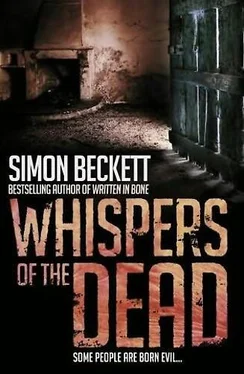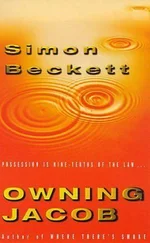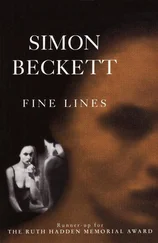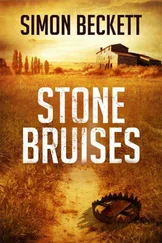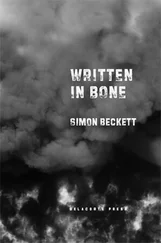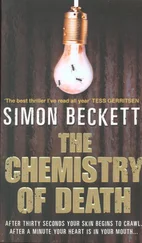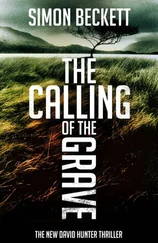He climbed out of the car. I did the same, forcing open the door against the push of branches. I looked round, hoping to catch a glimpse of another swamp darner, anything that would tell me this wasn’t a waste of time. But the woods were mockingly empty.
Paul’s shoulders had slumped in defeat as he contemplated the enclosing tangle of trees. The hope that had briefly fired him up had burned itself out.
‘This is useless,’ he said, his face a carving of despair. ‘We’re miles from where York abandoned the ambulance. Hell, we’re almost back at where he had the accident. We’re wasting our time.’
I almost gave up then. Almost got back in the car, accepted that I’d over-reacted. But Tom’s words came back to me: You’ve got good instincts, David. You should learn to trust them more.
For all my doubts, my instincts still told me this was important.
‘Just give me a minute.’
The branches overhead whispered as a breeze disturbed them, then fell silent again. I went to where a rotting tree trunk sprouted pale, plate-like fungi, and climbed on to it. The vantage point made little difference. Except for the overgrown track we’d followed there was nothing to see but trees. I was about to get down again when the branches overhead stirred and rustled as the breeze returned.
And then I caught it.
The faint, almost sweet taint of decomposing flesh.
I turned my face to the breeze. ‘Can you…’
‘I smell it.’
There was a tightness to his voice. It was an odour both of us were too familiar with to mistake. Then the breeze died, and the air held just the normal scents of the forest.
Paul looked round frantically. ‘Did you get where it was coming from?’
I pointed across the hillside, in the direction the breeze seemed to have been blowing from. ‘I think it was that way.’
Without a word, he strode off through the woods. I gave the car a last glance, then left it and hurried after him. The going was difficult. There was no path or trail, and neither of us was dressed for hiking. Branches plucked at us as we picked our way along the uneven ground, the thickets of bushes making it impossible to keep to a straight line. For a while we were able to use the car to keep our bearings, but once that was out of sight we had to rely on guesswork.
‘If we go much further we’re going to get lost,’ I panted, when Paul stopped to disentangle his jacket from a low branch. ‘There’s no point just wandering about without knowing where we’re going.’
He scanned the trees around us, chest rising and falling as he gnawed at his lip. Desperate as he was for anything that would lead him to York and Sam, he knew as well as I did that it might just have been carrion we’d caught wind of.
But before either of us could say anything else the branches around us shivered as the breeze picked up. We exchanged a look as we caught the odour again, stronger than ever.
If it was carrion it was something big.
Paul picked up a handful of pine needles and tossed them into the air, watching which way they were blown. ‘That way.’
We set off again, with more confidence this time. The smell of decay was noticeable even when the breeze dropped now. You don’t need a detector to smell this, Tom. As though to confirm we were heading in the right direction I caught a metallic shimmer as a dragonfly flashed through the trees up ahead.
Then we saw the fence.
It was partly hidden by scrub pine and bushes, eight feet high wooden slats topped with razor wire. The slats were rotten, and what looked like a much older chain-link fence ran round the outside, rusted and sagging.
Paul seemed charged with an almost feverish energy as we began to pick our way along the boundary. A little further along a pair of old stone gateposts had been incorporated into the fence, now blocked off with wooden slats. The ground in front was overgrown, but deep parallel grooves were still visible.
‘Wheel ruts,’ Paul said. ‘If there’re gateposts there must’ve been a road of some sort. Could be the same track we were following.’
If it was it hadn’t been used in a long time.
The smell of decomposition was much stronger now, but neither of us made any comment. There was no need. Paul stepped over the sagging chain-link fence and took hold of one of the wooden slats. There was a splintering crack as the rotten wood came away in his hands.
‘Wait, we need to tell Gardner,’ I said, reaching for my phone.
‘And say what?’ He wrenched at the fence, grunting with exertion. ‘You think he’s going to drop everything and come running because we smelled something dead?’
He kicked at a slat until it broke, then began furiously working at another, prying it loose from a stubborn nail with a loud creak. Bushes poked through the gap from the other side, obscuring whatever else might be through there. Tearing away the last few splinters of wood, he spared me a brief glance.
‘You don’t have to come with me.’
He began to climb through the fence. Within seconds there were just waving branches to show where he’d been.
I hesitated. No one knew where we were, and God only knew what lay behind the fence. But I couldn’t let Paul do this alone.
I squeezed through the gap after him.
My heart jumped as something caught hold of my jacket. I tugged at it in a panic until I saw I’d only snagged it on a nail. I pulled free and carried on. Bushes crowded right up to the fence on this side. Ahead of me I could hear snapping and rustling as Paul forced his way through them. I followed as best I could, shielding my face with one hand as twigs clawed at my eyes.
Then I stepped clear and almost walked into him.
We’d emerged into a large garden. Or, rather, what had once been a garden; now it was a wilderness in its own right. Ornamental shrubs and trees had run riot, crowding each other in the fight for space. We stood in the shade of a huge magnolia, the scent from its waxy white flowers cloying and sweet. Directly ahead of us stood an old laburnum, heavy branches dripping with clusters of yellow.
Underneath it was a pond.
It must have once been the garden’s centrepiece, but now it was stagnant and rank. Its edges were slowly drying out and choked with reeds, while the viscous green water was filmed with scum. A cloud of midge-like insects danced above its surface like dust motes in the sunlight.
Feeding on them were the dragonflies.
There were dozens of them. Hundreds. The air hummed with their wings. Here and there I saw the iridescent colours of other, smaller species, but it was the tiger-striped swamp darners who ruled, eyes shining like sapphires as they darted in an intricate ballet above the water.
I shifted to get a better view and felt something snap under my foot. Glancing down I saw a pale, green-white stick in the grass. No, two sticks, I thought. And then, like a picture coming into focus, what I was seeing resolved itself into the twin bones of a human forearm.
I slowly stepped back. The body lay half hidden in the undergrowth by my feet. It was fully skeletonized, shoots of bright spring grass already growing through the moss-covered bones.
Black female, adolescent: the assessment came automatically. As though it had been waiting for that moment, now the smell of decomposition reasserted itself over the thick scent of magnolia.
Beside me, Paul spoke in a whisper. ‘Oh, my God…’
I slowly lifted my gaze. The dragonflies weren’t the only inhabitants of this place.
The garden was full of corpses.
They were in the grass, under the trees, in the undergrowth. Many were little more than stripped bones lying in the greenery, but some were more recent; leathery intestines and cartilage still host to flies and maggots. No wonder none of York’s earlier victims had been found.
Читать дальше
